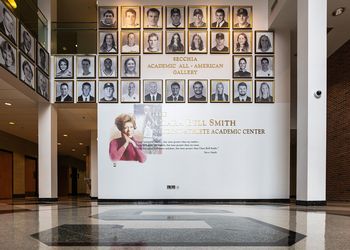Feature: MSU's Honors College: A Half Century of Excellence

A half century after its founding, Honors College continues to perfect its mission of serving MSU’s best and brightest students.
In the mid-1950s, around the time of MSU’s Centennial, President John A. Hannah and various academic leaders wanted to find a way to make an MSU education more meaningful for top echelon students. They recognized that a single standard course of study was unlikely to serve all types of students well. So, Honors College was proposed. This bold, new concept sought to challenge students by a level of academic work appropriate to each student and to provide substantial academic flexibility. In 1957, Honors College opened.
As we celebrate the 50th anniversary of this noble experiment, one thing is clear. The concept proved to be a worthwhile endeavor, tested by time. Honors College continues to attract high-achieving students to Michigan State and to provide, in cooperation with the colleges and academic departments at the university, a challenging and enriching set of academic opportunities for Honors students. It’s safe to say that Honors College will continue to be a key component of the Michigan State experience.
This perspective was reinforced on February 24, when alumni, friends, administrators, students and staff gathered for the college’s 50th Anniversary Reunion, held at the MSU Union.
MSU President Lou Anna K. Simon who, together with President McPherson, had committed MSU to reinvesting in Honors College and Honors students during the 1990s, welcomed the participants at the opening luncheon in the Union Ballroom. Simon noted that MSU’s Honors College to MSU served as a model for honors education across the country.
“There are lots of stories to be told about the Honors College,” she said. “The students who have been a part of it who have gone on to have lives that have enriched others, made extraordinary scientific discoveries, people who have made a difference in the business world. Part of a reunion like this is to share those stories. It’s also an opportunity to reflect on the future, and what the Honors College can be for the next 50 years. And there are the seeds of that terrific future, as you meet the students of today, as you think about the way in which we try to engage students in research and scholarship from day one.” Indeed, from its establishment in 1956 with only 319 students, Honors College has been anything but ordinary for Michigan State. It was “boldness by design” exemplified. Its original mission statement made a bold declaration that for an honors student, “all requirements for his graduation, other than total number of hours, will be waived.”
And as Ron Fisher, current dean of Honors College, notes, “The idea was that each student and a faculty academic advisor would develop an appropriate academic program . . . How this principle has been implemented has varied over the years, but the fundamental philosophy has remained consistent.”
This basic philosophy has translated into considerable flexibility and freedom over the academic planning of Honor students, who are given access to all classes in the university, substitute departmental courses for general education requirements, and enroll in special Honors courses. Honors students are also eligible to enroll in graduate courses. At commencement, Honors students wear a special Honors College stole.
The main purpose of Honors College was to allow the exceptional student to design his or her own curriculum and learn at a pace unhindered by others. But it was clear that John Hannah also wanted Honors College to serve as a springboard for some students to win major awards. An excerpt from Council of Deans meeting, Jan. 15, 1963, reads, "President Hannah . . . who served on the Michigan Committee on the selection of Rhodes Scholars, stated that no nominations for these scholarships had been made from this institution during his period of service . . . It was suggested that we ought to identify prospective candidates in their freshman year and follow through with them . . . [and] that this activity might be centered in the Honors College.”
Indeed, MSU students have a remarkable reward of recognition through major national and international scholarships and fellowships. Over the years, 16 MSU students have become Rhodes Scholars—a number that puts MSU among the top public universities producing Rhodes Scholars. In addition, MSU students have been recognized as 23 Goldwater Scholars, 15 Churchill Scholars, 15 Truman Scholars, 11 Marshall Scholars, 7 Udall Scholars, 3 Hollings Scholars, 2 Gates Cambridge Scholars, and 1 Mitchell Scholar, and have also won numerous national science fellowships.
Such outstanding results must please past directors Stanley Idzerda (1957-65), James Pickering (1975-81), and Donald Lammers (1981-96), who joined Fisher for the 50th Anniversary Celebration to reflect collectively on 40 of the 50 College years.
Idzerda, the first director of the college, recalled his experiences working with President John Hannah and Vice President Thomas Hamilton, among others, to launch the initial Honors College. Informing both students and faculty about the new Honors College, encouraging students to join, and finding faculty with similar visions for honors education were among his chief challenges.
Idzerda also shared humorous interactions that he had with other departments. “Some thought that I was not doing the students any good, because the students, after they kept meeting with me individually, thought they could accomplish anything!” he recalled. “They said so many of them are overachievers. I’m not that good on psychological educational theory but I’ve never understood how you could over achieve!”
In 1968, Honors College moved from the Library to Eustace Hall, originally designed as a horticulture laboratory by Liberty Hyde Bailey. James Pickering shared his experience of applying to have Eustace Hall put on the National Register of Historic Places. Concerned that the Honors College might someday lose its new home in Eustace Hall, Pickering arranged for the official plaque to include the statement “Now home of the Honors College” as insurance that the College would remain in building. Those concerns never materialized, of course, as the College remains in what today is known as Eustace-Cole Hall, renamed and remodeled in 1999 as a result of a major gift from 1970 alumnus Jeffrey Cole (see pp. 16-19, Spring 1998).
Donald Lammers spoke glowingly of the late Honors College adviser and assistant director, Scott Vaughn, who had retired in 2004 after serving with Honors College for 35 of its 50 years. “Scott was the theorist of the Honors College, in so far as we had one,” he recalled. “He had the ideas and the conceptual framework worked out . . . he was the conscience of the Honors College. He actively stimulated us to defend and rationalize what we chose to do in the way of altering and modifying programs.”
Fisher noted how the College had evolved over the years so that today it encompasses four main divisions. Best known, probably, is the core university-wide honors program for undergraduates, which provides academic research and social opportunities for students in all academic majors of the university who are invited and accept membership. Second, the Academic Scholars Program provides special academic opportunities during the first two years at MSU for a set of incoming freshmen students whose academic records place them just short of eligibility for Honors College membership as incoming freshmen. Third, the Gifted and Talented Education Programs provides academic enrichment opportunities for high-achieving pre-college students. Finally, MSU’s nationally competitive Debate Team is housed administratively in and coordinated through Honors College.
A leader in faculty-led undergraduate research opportunities, the Professorial Assistant program was established in 1984 to permit students to work (and be paid) as research assistants with MSU faculty, even in their freshmen year. In 2006, a series of Honors Research Seminars were established to double the number of students participating in faculty-led research experiences.
With some 3,000 MSU students currently participating in its programs, more than 250 faculty members across the University serving as Honors advisers, 190 Honors classes offered by departments and colleges, and at least 500 Honors College members working directly with faculty on research or creative projects, the College has truly grown and prospered.
With alumni from every MSU academic college and discipline, the accomplishments of those alumni remain the lasting legacy of the Honors College.
After 50 years, tens of thousands of students have completed the Honors College program at MSU and are Honor College as well as MSU alumni. Located around the globe, and working in a wide variety of professional endeavors, these individuals are among some of the university’s most recognized and influential alumni. For example, Honors College alumni in higher education include the past presidents of many universities, the current provosts at both MSU (Kim Wilcox) and the University of Michigan (Theresa Sullivan), the dean of admissions at the University of Chicago (Ted O’Neill), as well as many distinguished faculty members. In politics, U.S. Senator Debbie Stabenow and recently elected Ohio State Treasurer Richard Cordray are alumni. And in the pop culture vein, the founding editor of Teen Vogue magazine is alumna Amy Astley.
Alan Lesgold, ’67, dean of the School of Education at the University of Pittsburgh, credited his experience with the Honors College as a catalyst for his professional success. “I've done experimental psychology, started a program in artificial intelligence, studied expertise in medicine, developed powerful intelligent computer environments to teach people to fix complex equipment, and worked on preparing teachers and teaching reading,” he related. “The spirit of adventure instilled by the Honors College is what made me believe I could do these things and what prepared me for them.”
Former director James Pickering shared his excitement about the current state of the Honors College. “To hear Ron talk about the strength of the College today with the number of members, the demographics that define the quality of the students, and then to go over there and see Eustace Hall—it’s wonderful,” he said. “As I look back over my own educational career, being director of the Honors College was the best job I ever had. In terms of the day-to-day satisfaction of not only working with faculty members who I never would have gotten to know, but working with some of the greatest students in the world.”
Katie Cable is alumni relations coordinator for MSU’s Honors College.



